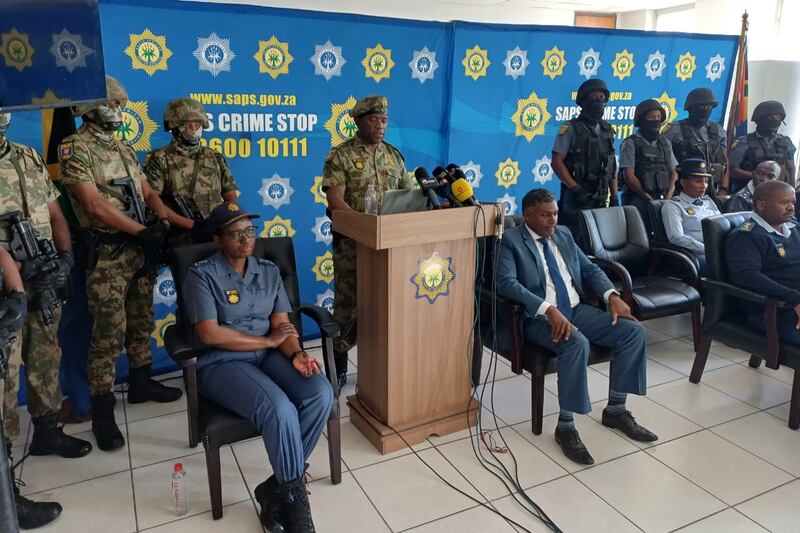As provincial commissioner Nhlanhla Mkhwanazi declared at the Sunday press conference that “I will die for this badge”, he sounded like a military operative making a heroic statement. The plain truth, after listening to the entire speech, is that he expressed a specific aspect of section 197 of the South African constitution, which states that “within public administration there is a public service for the republic, which must function ... and loyally execute the lawful policies of the government of the day.”
The public service is a crucial part of our national public administration system, a relationship that the state organs, whether elected or appointed, must not take for granted. It is a relationship based on trust that society has placed in us to manage public power and enforce laws, including combating criminality. Upholding this trust is not just a duty but a solemn responsibility.
Public trust in the public service, especially in a sensitive area such as crime prevention, always hinges on a relationship with us, the people or citizens, no matter how brief. This relationship must not be purely transactional; it needs the law to safeguard its endurance. While allowing managerial or leadership discretion, the constitutional order does not tolerate unlawful prerogative or arbitrary decisions. Transparency is the key to maintaining this trust and upholding the very purpose of justice.
Any breach of confidence, particularly concerning sensitive information, diminishes morale and fosters chaos, which can ultimately turn off the entire service delivery system.
South Africa has not fully recovered from a state capture scenario, a situation in which individuals, either directly or indirectly connected to those holding executive authority and public power, were manipulated — voluntarily or otherwise — to partake in or endorse wrongful actions. The Zondo commission report’s findings are fresh enough for us to engage with people outside the legal system, particularly regarding state security information, especially crime intelligence. The impact of this state capture is urgent and cannot be ignored.
Unless proven otherwise, Mkhwanazi's conduct exemplifies how to respond to unlawful instructions when entrusted with a public service delivery obligation. It is fresh air on the path towards a meritocratic and capable state. Beyond his known skills and knowledge about policing, his accumulated experience further sharpens the qualities needed to address the scale of organised crime in South Africa.
In his presentation, Mkhwanazi highlighted executive overreach in matters governed by staff orders. Apart from the possibility of fudging executive authority and policing orders management, Mkhwanazi said disbanding the political killings investigation task team was unlawful, if not a clear case of overreach. He suggested that even the police commissioner cannot order any stoppage of a criminal investigation. We have seen how the Scorpions were closed, but the investigations could not be halted; only their processing for prosecution was affected. In this case, and according to the general, it appears the overreach extended to the point of smashing and grabbing the dockets.
The president and the ANC must explain why the minister should not be asked to step aside regarding reputation management and undermining the state's crime prevention efforts. This follows previous allegations at the executive level raised by the opposition, which claims a lack of fairness in addressing these issues.
The decorum and forthrightness with which Mkhwanazi conducted the press conference ticked several boxes of a trusted senior bureaucrat operating within his oath of office. He made no accusations but outlined a sequence of events, including instances of overstepping authority and accountability. He placed the onus on the minister to prove that his behaviour in the downloaded messages was consistent with the oath of office he signed.
In an organisation such as the South African Police Service — where executive decisions made by appointed or elected officials can ultimately result in loss of life — trust and betrayal hold equal significance. Any breach of confidence, particularly concerning sensitive information, diminishes morale and fosters chaos, which can ultimately turn off the entire service delivery system.
Whatever the president's response to the press conference's consequences, for SAPS — especially in KZN — to remain focused, its members must trust the minister as their leader, collaborate with colleagues nationally and believe in themselves as operatives working within a hostile, organised crime-infested society. This is because their leaders shape the character of a police service member; if the doubts stemming from the press conference are not promptly addressed, it could take a generation to repair the damage caused by visible wounds.
The SAPS rant by Mkhwanazi reflects what is common in the public service, which often falls short of fulfilling the constitutional duty to implement only the lawful policies of the government of the day loyally. The absence of appropriately trained public service C-Suites at the altar of the widespread ‘cadre deployment’, a practice where political parties appoint their members to key positions in the public service, continues to hinder the public service from refusing to carry out unlawful political directives.
At best, individuals displaying the courage of Mkhwanazi will be erased from the public service, and at worst, they will face relentless persecution by the system.
• Dr FM Lucky Mathebula is head of faculty, People Management and founder of The Thinc Foundation, a think-tank based at the Da Vinci Institute
For opinion and analysis consideration, email opinions@timeslive.co.za






Would you like to comment on this article?
Sign up (it's quick and free) or sign in now.
Please read our Comment Policy before commenting.